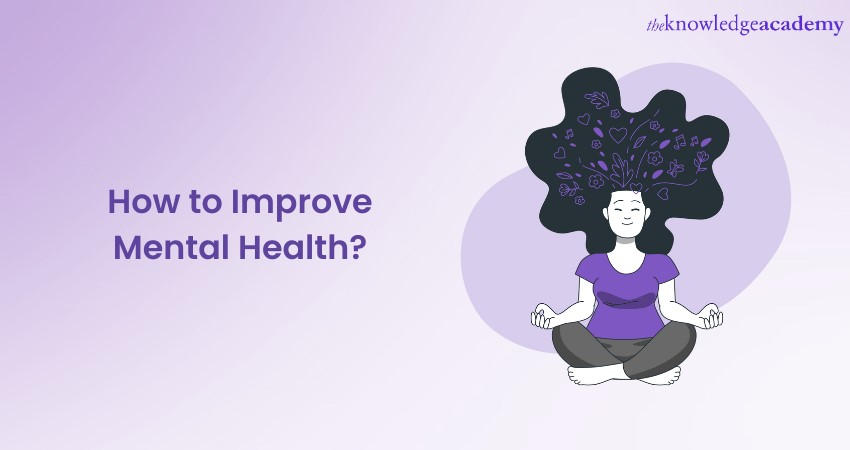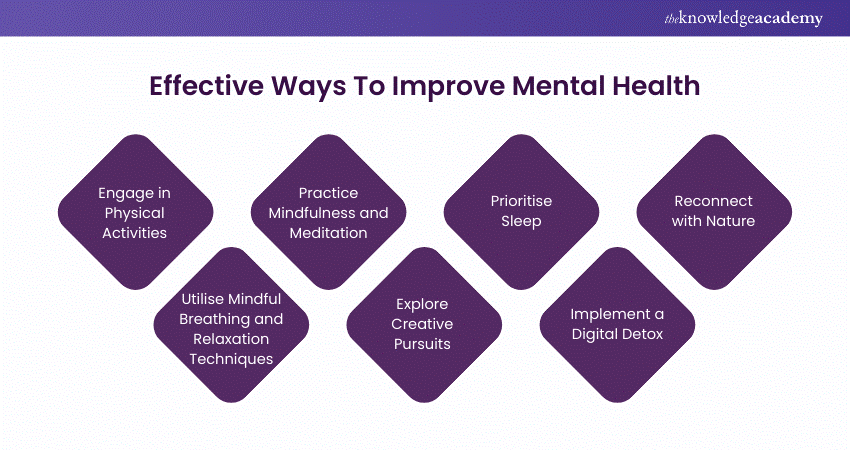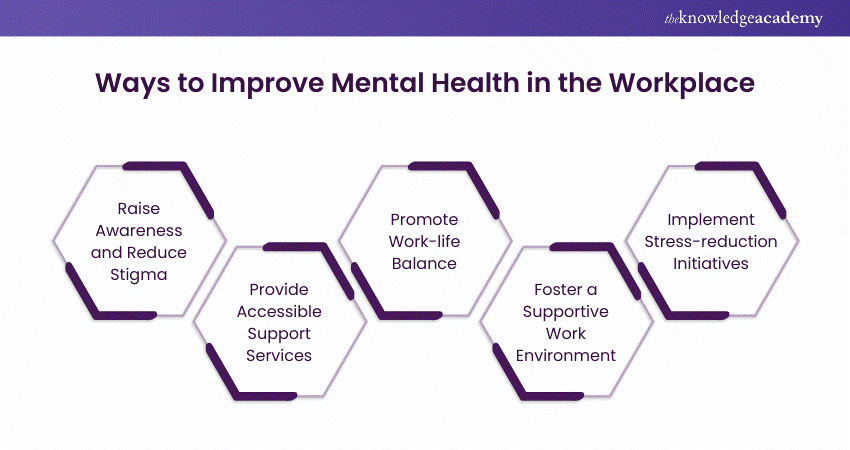We may not have the course you’re looking for. If you enquire or give us a call on +44 1344 203999 and speak to our training experts, we may still be able to help with your training requirements.
Training Outcomes Within Your Budget!
We ensure quality, budget-alignment, and timely delivery by our expert instructors.

Mental Health is a crucial part of our entire well-being, yet it is often overlooked and misunderstood. It affects how we think, feel, and act, influencing how we handle stress, relate to others, and make decisions. Hence, taking care of Mental Health is vital for our well-being. But How to Improve Mental Health?
According to Statista, there were 914,000 workers in Great Britain who reported work-related stress, depression or anxiety in 2021-2022. If we don't take care of our Mental Health, it can cause not only psychological disorders but also physical disorders. In this blog, you will learn How to Improve Mental Health and some essential tips which can help you lead a healthy lifestyle.
Table of Contents
1) Why is Mental Health Important?
2) 10 Tips to Improve Mental Health
a) Engage in Physical Activities
b) Practise Mindfulness and Meditation
c) Prioritise Sleep
d) Reconnect With Nature
e) Utilise Mindful Breathing and Relaxation Techniques
f) Explore Creative Pursuits
g) Pursue Learning and Intellectual Stimulation
h) Incorporate Brain-healthy Diet
i) Express Through Journaling and Expressive Writing
j) Implement a Digital Detox
3) How to Improve Mental Health in the Workplace?
4) Conclusion
Why is Mental Health Important?
Mental Health is crucial as it enables you to:
a) Manage Life’s Stresses: Effectively handle challenges and bounce back from setbacks, ensuring you stay resilient in the face of adversity.
b) Maintain Physical Health: A healthy mind contributes to a healthy body, reducing the risk of various physical ailments.
c) Foster Strong Relationships: Build and sustain meaningful connections with others, enhancing your social support network.
d) Contribute to Your Community: Engage in and support community activities and initiatives, making a positive impact on those around you.
e) Work Efficiently: Enhance productivity and performance in your professional life, leading to greater job satisfaction and career growth.
f) Achieve Your Potential: Unlock and realise your full capabilities and aspirations, allowing you to pursue your goals and dreams with confidence.
By prioritising Mental Health, you can lead a more balanced, fulfilling, and productive life, ultimately improving your overall well-being and happiness.
10 Tips to Improve Your Mental Health
Improving mental well-being involves a diverse range of activities, from physical exercises and creative pursuits to mindfulness practices and fostering meaningful connections. Let’s explore the 10 effective ways to boost your overall mental health:

Engage in Physical Activities
Physical activities are renowned for their positive impact on mental well-being. Regular exercise releases endorphins, the body's natural stress relievers, promoting a sense of well-being and reducing symptoms of anxiety and depression. Incorporate physical exercises in your daily routine, whether brisk walking, jogging, yoga, or dancing. This not only enhances cardiovascular health but also boosts self-esteem and cognitive function.
Practice Mindfulness and Meditation
Practising mindfulness and meditation techniques can significantly improve mental clarity and emotional stability. Mindfulness involves being fully present in the moment and observing thoughts and feelings without judgment. Meditation, however, promotes relaxation by focusing the mind and eliminating the jumbling thoughts.
Prioritise Sleep
Sleep is the best way for our body and mind to recharge and rejuvenate. One way to get better sleep is to avoid screens—TV, phones, tablets, or computers—in the hours before bedtime. Instead, you can listen to music or read a knowledgeable book for a more relaxing pre-sleep routine.
Reconnect With Nature
Spending time in nature has been scientifically proven to reduce stress and promote mental well-being. Whether it's a walk in the park, hiking in the mountains, or simply sitting in a garden, nature provides a soothing environment that rejuvenates the spirit. Recent studies have shown that exposure to nature reduces rumination, a thought pattern linked to depression that enhances creativity and problem-solving skills.
Utilise Mindful Breathing and Relaxation Techniques
Practise mindful breathing exercises and relaxation techniques, such as progressive muscle relaxation and guided imagery, to calm the mind and reduce stress. These techniques promote a sense of tranquillity and can be practised anywhere, making them valuable tools for managing anxiety and promoting relaxation.
Explore Creative Pursuits
Engaging in creative activities like painting, writing, playing a musical instrument, or crafting stimulates the brain's creative centres and encourages the development of new neural connections. These activities can serve as a cathartic release, helping individuals process emotions and gain insights into their thoughts and feelings.
Want to learn more about how you can improve your well-being? Then sign up now for our Mental Health and Well-being Training
Pursue Learning and Intellectual Stimulation
Continuous learning and intellectual engagement are essential for maintaining a healthy mind. Try pursuing newer skills, hobbies, or educational courses to stimulate the brain and promote the growth of neural connections.
Elevate your Stress Management skills and resilience with our course on Handle Stress and Develop Your Resilience
Incorporate Brain-healthy Diet
Make sure to include mood-boosting nutrients such as Omega-3 Fatty Acids, B Vitamins, Magnesium, Tryptophan, Zinc, Iron, Probiotics, and Antioxidants in your daily diet. Incorporate foods like walnuts, flaxseeds, eggs, and leafy greens such as spinach, legumes, dark chocolate, cheese, red meat, and yoghurt to get these essential nutrients and promote a balanced, positive mood.
Express Through Journaling and Expressive Writing
Writing about your thoughts, emotions, and experiences can be a therapeutic way to process feelings and gain insights into your mental state. Journaling allows you to release pent-up emotions, organise your thoughts, and identify patterns in your thinking. As per the studies, expressive writing has been shown to improve mood, reduce stress, and enhance overall well-being.
Implement a Digital Detox
Taking breaks from screens and digital devices can significantly benefit Mental Health. The reason being, continuous social media exposure can lead to feelings of inadequacy and anxiety. Designate specific times of the day for a digital detox. Engage in activities such as reading a physical book, gardening, or simply enjoying a face-to-face conversation at this time.
Unlock your potential and achieve personal growth-Register now for our Psychology of Personal Growth Training
How to Improve Mental Health in the Workplace
A healthy workplace not only benefits individual employees but also enhances productivity, teamwork, and organisational success. Here are key strategies to understand How to Improve Mental Health in the workplace:

Raise Awareness and Reduce Stigma
One of the first steps in improving Mental Health in the workplace is to raise Mental Health awareness. You can also help by reducing the stigma that is associated with Mental Health issues. Conducting workshops, seminars and training sessions to educate employees about Mental Health and common disorders, is a good step towards destigmatising misconceptions about Mental Health. Encourage open discussions to create a supportive atmosphere. This relaxed atmosphere will make the employees feel comfortable talking about their Mental Health issues without fear of judgment.
Provide Accessible Support Services
Having confidential channels where employees can seek help for personal or work-related issues can make a significant difference. Make sure that employees are aware of these resources. Moreover, consider providing training to managers and supervisors on how to identify signs of mental distress and offer appropriate support to their team members.
Promote Work-life Balance
The burnout often results from excessive workload and constant pressure. By encouraging balance, employees can recharge, spend quality time with their families, and pursue hobbies. Encouraging a healthy work-life balance by setting reasonable working hours, promoting flexible schedules, and respecting employees' time off. This can help reduce the stress of employees.
Elevate workplace dynamics with our Psychology of Behaviour at Work Training. Join now!
Foster a Supportive Work Environment
Fostering a supportive work environment can cultivate a culture of empathy, respect, and understanding where employees feel valued, encouraged, and empowered. Encourage teamwork, collaboration, and mutual support among colleagues. This practice can help foster a sense of belonging and connection, significantly boosting morale and mental resilience.
Implement Stress-reduction Initiatives
Stress is a strong contributor to Mental Health issues. Implement stress-reduction initiatives such as yoga classes, meditation sessions, or relaxation workshops in your daily lives. Moreover, physical activities like group exercises or walking groups should be practised during breaks to reduce stress and improve overall well-being. For this, you can choose a designated quiet space where employees can take short breaks to relax and recharge during the workday.
Want to learn essential skills to identify workplace stress and support Mental Health? Then sign up now for our course on Workplace Stress and Mental Health Identification for Manager Course
Encourage Regular Communication
Promote open and regular communication between managers and employees. Managers should continuously check in with their team members to discuss work-related challenges, goals, and achievements. Encourage employees to express their concerns and provide feedback. This approach can foster a sense of trust and transparency within the workplace.
Offer Training on Stress Management and Resilience
Organise training sessions on Stress Management techniques, resilience-building, and coping strategies. Organisations can equip employees with the skills and knowledge to handle stress effectively and manage their workload. This can also help them to maintain a positive mindset even in challenging situations. Resilient employees are better equipped to navigate workplace pressures and bounce back from setbacks.
Promote Physical Health
Physical health and mental well-being are closely intertwined. Encourage physical health initiatives such as providing access to gym facilities, organising group exercises, or promoting walking meetings. Healthy eating options in the workplace can also contribute to employees' overall well-being—regular physical activities and a balanced diet help in improving Mental Health.
Recognise and Reward Efforts
Acknowledging and rewarding employees' hard work and contributions is vital for maintaining morale and mental well-being. Regularly recognising achievements through formal awards or simple words of appreciation helps build self-esteem and reinforce a positive workplace culture. When employees feel valued and appreciated, it fosters a sense of purpose and belonging, reducing stress and boosting overall job satisfaction.
Provide Continuous Learning and Development Opportunities
Continuous learning and development opportunities can significantly improve mental health by empowering employees with new skills and knowledge. This enhances their job performance and contributes to their personal growth and sense of accomplishment. Encourage employees to pursue training, workshops, or certifications that align with their interests and career goals. This investment in their development can lead to greater job satisfaction, motivation, and mental resilience.
Handle work stress, sign up for our Handle Anxiety Course!
Conclusion
We hope you find this blog meaningful and informative. Learning How to Improve Mental Health is a journey that involves self-awareness, self-care, and support from others. By understanding the various aspects of Mental Health and implementing the Mental Health tips discussed in this blog, you can take significant steps toward enhancing your overall well-being.
Empower your career, learn counselling with our Counselling Course- get started now!
Frequently Asked Questions

Mental disorders are caused by a combination of several factors, including genetics, brain chemistry, life experiences, trauma, and environmental stressors. Other reasons can include childhood adversity, long-term stress, and lifestyle factors such as drug use or lack of sleep.

Borderline Personality Disorder (BPD) is often considered one of the most challenging mental illnesses to live with because of its intense emotional pain, unstable relationships, and difficulty in managing overwhelming emotions.

The Knowledge Academy takes global learning to new heights, offering over 30,000 online courses across 490+ locations in 220 countries. This expansive reach ensures accessibility and convenience for learners worldwide.
Alongside our diverse Online Course Catalogue, encompassing 17 major categories, we go the extra mile by providing a plethora of free educational Online Resources like News updates, Blogs, videos, webinars, and interview questions. Tailoring learning experiences further, professionals can maximise value with customisable Course Bundles of TKA.

The Knowledge Academy’s Knowledge Pass, a prepaid voucher, adds another layer of flexibility, allowing course bookings over a 12-month period. Join us on a journey where education knows no bounds.

The Knowledge Academy offers various Mental Health Courses, including the Mental Health and Well-being Training, Anxiety Courses, and Positive Psychology Course. These courses cater to different skill levels, providing comprehensive insights into Reverse Psychology.
Our Health & Safety Blogs cover a range of topics related to Mental Health, offering valuable resources, best practices, and industry insights. Whether you are a beginner or looking to advance your Mental Health Awareness skills, The Knowledge Academy's diverse courses and informative blogs have got you covered.







 Top Rated Course
Top Rated Course




 If you wish to make any changes to your course, please
If you wish to make any changes to your course, please


